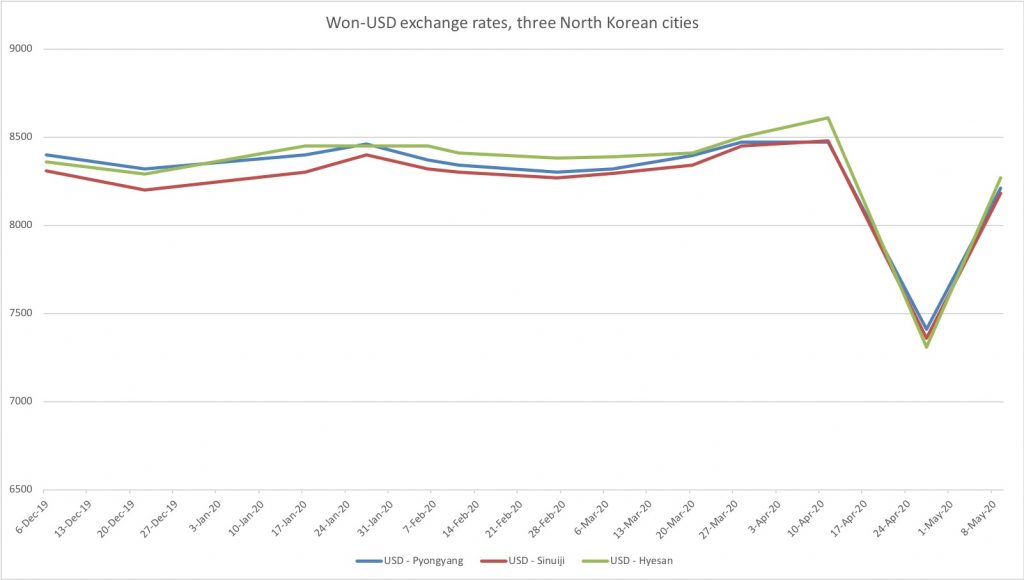By: Benjamin Katzeff Silberstein
This blog has followed as closely as possible, over the past few months, the issue of North Korea’s public bonds program. It was in April of this year that news first surfaced of the North Korean government having issued public bonds, to drive in more cash to the state. The central worry with all this was that the state would use coercive methods to force people to purchase bonds, thereby creating significant distress among the public, and sucking out resources from the private economic sector.
For months, however, little subsequent reporting came on the bonds. This indicated that the state was perhaps not moving forward with the program all too aggressively.
It turns out this seems to have been what happened. Some days ago, Daily NK, who originally broke the story, reported that the North Korean government appears to have abandoned the project around early September, after what some claim was some initial success:
While the halting of the scheme appears to signal its overall failure, some North Korean officials believe that the bonds helped to quickly bring in funds the state needed to continue building the Pyongyang General Hospital and prepare for the Party Foundation Day celebrations on Oct. 10.
A Pyongyang-based source told Daily NK yesterday that the Central Committee’s Economic Affairs Department issued an order early last month to the Cabinet and its subordinate agencies that concerned “suspending the issuance of the bonds.”
The order noted that the “distribution of the state agency public bonds and state trade public bonds” would “temporarily be suspended”; that there would be a review of the bonds that were sold and those in stock by the State Planning Committee’s Financial Affairs Board; and, that bonds allotted to “each agency” would be collected, then gathered and “frozen” at the Central Bank. In short, the order stated that all bonds – except for those already in distribution or sold – will no longer be considered valid.
The source, who spoke on condition of anonymity, told Daily NK that the order further stated that “in accordance with an order from the central [leadership], a review of the current financial status of agencies that have used the public bonds will be conducted and [their] planned quotas for this year may be adjusted.” This suggests that the leadership is willing to “eliminate difficulties” faced by “lower-ranking work units” that “loyally” took part in the bonds scheme and that they may receive unspecified “benefits.”
The Economic Affairs Department’s order was reportedly issued after North Korean leader Kim Jong Un acknowledged the failure of his country’s economic policies at a Workers’ Party plenary session in August.
“[The] economy was not improved in the face of the sustaining [sic] severe internal and external situations and unexpected manifold challenges,” Kim reportedly said during the plenary session. He also announced during the meeting that a new five-year economic development plan would be presented at the Eighth Party Congress next January.
It appears that after Kim acknowledged the failure of the country’s existing “five-year economic development strategy” and presented plans to establish new economic goals the Central Committee’s Economic Department discussed revising the scale of the public bonds scheme.
According to the source, the Economic Affairs Department order stated that it “permits the revision of tasks related to the five-year people’s economic plan of last year and this year due to the distribution of public bonds.”
As part of efforts to increase the country’s foreign currency stores, North Korean authorities gave members of the donju, North Korea’s wealthy entrepreneurial class, and private business people “business rights” in return for having them purchase the bonds in foreign currency. Now that the bonds are not longer being issued, it appears that the Economic Affairs Department has been forced to revise its plans.
[…]
An internal investigation by the Central Committee in August found that less than 20% of the bonds earmarked for the donju (“state trade public bonds”) were sold off.
The authorities tried to woo the donju and private business people to buy the bonds by offering them “patriotism awards” and “business rights”; when that did not work, the authorities resorted to “forced allocations.” All of these efforts apparently had little effect in getting the bonds sold. The failure to sell the bonds seems to have been a major factor in the Economic Affairs Department suspending the sale of the bonds.
Within the Economic Affairs Department, however, some argue that the public bond scheme has not “completely failed” and that it “significantly helped” the country prepare for the Party Foundation Day celebrations despite facing unexpected obstacles such as the COVID-19 pandemic, typhoons, and floods. They also claim that the public bonds scheme was an “experimental yet daring attempt.”
In contrast to this assessment, the source argued that the “public bonds [scheme] was a measure that completely failed to consider the realities of the people’s economy [civilian economy].”
(Source: Jang Seul Gi, “N. Korea suspended public bonds scheme in early September,” Daily NK, October 23, 2020.)
The allocation of “business rights” sounds an awful lot like an attempt to more strongly formalize practices on which the economy already runs…
In any case, this signals a comforting sense of pragmatism among North Korean economic policy makers on this particular issue. It’s impossible to rule out, however, that the idea might come up again should the economic situation continue to deteriorate, and perhaps, regrettably, with stronger methods of coercion to back it.

